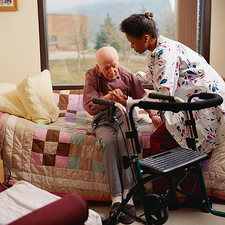At some point our loved ones may need assistance with daily living activities or other kind of help. The cost of care will depend on how much care is needed, and what type of services is equired.
What options for long-term care do we have and how much do they cost?
Four options to consider are:
- nursing homes,
- assisted living communities,
- home care services,
- adult day services.
Let’s discuss each of them.
Nursing homes

Image courtesy of Design for Generations, LLC
Nursing home is a place of residence for people who require continual nursing care and need assistance with activities of daily living. Nursing aide is usually available 24 hours a day. Some people use them as short-term rehabilitation services, but most residents live there permanently.
Nursing homes' services typically include:
- room and board,
- meals,
- nursing care,
- medication management,
- personal care (assistance with ADLs),
- social and recreational activities.
Learn more about nursing homes from the Office of Elder Affairs.
Assisted Living Communities
People who used an Assisted living services usually need assistance with at least one of the activities of daily living. They would be seniors who do not need the level of care offered by a nursing home but like companionship and needs some assistance with day-to-day activities.
Assisted living communities typically offer:
- one bedroom apartment or private room,
- two or more meals per day,
- help with ADLs,
- housekeeping and laundry,
- healthcare monitoring,
- recreational activities,
- transportation.
Unlike nursing homes, assisted living communities don’t offer 24-hours nursing care and ADL’s assistance. Those services serve as a rehabilitation facility following hospital discharge.
Learn more about assisted living in Massachusetts from Massachusetts Senior Care Association.
Home Care services

Image courtesy of Home Care.com
Home care is provided in the patient's home and allows people to live as independently as possible in their own homes. Those services help people who are recovering after a hospital stay, or need assistance to stay safely at home. Patients can hire caregivers through an agency or use help of private caregivers. Most of the home care providers offer non-medical home care.
Home care services may vary depends on patients needs.
They may include:
- help with ADLs,
- housekeeping and laundry,
- meals preparation,
- companionship,
- transportation,
- medication management.
Adult Day Services

Image courtesy of work.chron.com
Adult Day Services is a non-residential facility that provides various services for adults. Those services include:
- daily living and meals,
- social activities in groups,
- personal care,
- transportation.
Those centers mainly focus on socialization; patients spend 10-12 hours per day in a supportive group environment. Learn more about Adult Day Care Programms from Massresourse.com.
Comparing costs of long term care
Cited below are the private-pay rates for 4 types of long term care in Massachusetts in 2012. The data retrieved from The 2012 MetLife Market Survey of Long-Term Care Costs.
| Care Type |
Nursing homes |
Assisted Living Communities |
Home Care Services |
Adult Day Services |
| Hourly Rate |
n/a |
n/a |
$18-$38 |
$21 - $90 |
| 24 hour rate |
$255-$500 |
$70-$210 |
$300-$650 |
n/a |
| Monthly Rate |
n/a |
$2,025 – $6,330 |
n/a |
n/a |
Alexander Schechter, the Executive Director of Ezra Home Care, comments the Survey findings.
“For people who require constant help with activities of daily living, nursing homes and home care services are the best-suited options. These services are compatible in terms of cost then 24 hours a day, 7 days a week care is needed.
For instance, a nursing home’s average daily rate in Newton, MA is around $350/month. The alternative to the nursing home option is a home care live-in service in which a caregiver lives at the client’s home. The average rate in Massachusetts for live-in home care is $300-350/month.”
In the next post, we will discuss the pros and cons of nursing homes residency and in-home care services.






 Tweet
Tweet
 Share
Share



